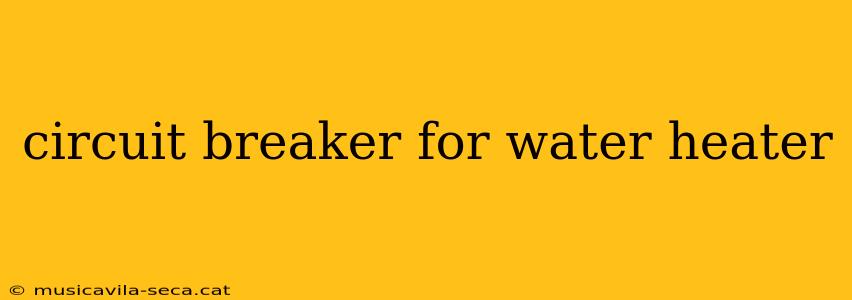When it comes to managing your home’s electrical system, one critical component is the circuit breaker, especially when it comes to high-demand appliances like water heaters. Understanding the functionality and importance of circuit breakers can help ensure your safety and maintain the longevity of your appliances.
What is a Circuit Breaker?
A circuit breaker is an electrical device that automatically interrupts the flow of electricity in a circuit to prevent overload or short circuits. It acts as a protective measure, ensuring that appliances do not draw more current than they can handle, which can lead to overheating and electrical fires.
Why Do Water Heaters Need a Dedicated Circuit Breaker?
Water heaters typically require a significant amount of electricity to operate, especially those that use electric resistance heating elements. Here are a few reasons why having a dedicated circuit breaker for your water heater is essential:
-
Overload Prevention: Water heaters can draw substantial current, particularly during the heating cycle. A dedicated circuit ensures that this high demand does not overload other circuits in your home.
-
Safety: In the event of a malfunction, the circuit breaker will trip, cutting off the power supply and preventing potential hazards such as electrical fires or appliance damage.
-
Code Compliance: Electrical codes often require certain appliances to have dedicated circuits. Having a separate circuit for your water heater may be necessary for legal compliance and to ensure safe installation.
How Do I Know What Size Circuit Breaker to Use?
The size of the circuit breaker you need depends on the wattage of your water heater. A general rule of thumb is to use a breaker that is rated at 125% of the water heater's amperage.
Example:
- If your water heater uses 4500 watts and operates on a 240-volt circuit, the amperage can be calculated as follows:
- Amperage = Watts / Volts
- Amperage = 4500W / 240V = 18.75A
Based on this calculation, you should use a 25A circuit breaker, as it provides a buffer above the 18.75A load.
Installation Tips for Circuit Breakers
- Hire a Professional: While some homeowners are comfortable performing electrical work themselves, hiring a licensed electrician is always recommended for safety.
- Follow Local Codes: Always check local electrical codes and regulations to ensure compliance.
- Consider Ground Fault Circuit Interrupters (GFCI): In wet areas, consider installing a GFCI breaker to protect against electrical shocks.
Maintenance and Troubleshooting Tips
- Regular Inspections: Periodically check your circuit breaker panel for signs of wear or corrosion.
- Keep Records: Maintain records of repairs and inspections to monitor the health of your electrical systems.
- Know the Signs of Trouble: If your circuit breaker frequently trips, it may indicate an underlying issue that needs immediate attention.
Conclusion
Installing a circuit breaker for your water heater is not just a technical requirement but an essential safety measure. By understanding the importance of these devices, you can protect both your home and your appliances.
For those looking to ensure their water heaters operate efficiently, considering factors such as correct sizing and professional installation can make a significant difference.
Additional Resources
For more in-depth information regarding electrical safety and circuit breakers, consider exploring resources from the Electrical Safety Foundation International or your local building authority.
References
This article is based on information gathered from various resources, including the insightful Q&A on WikiHow. For more detailed procedures and safety tips related to electrical work, visit WikiHow: How to Install a Circuit Breaker.
Disclaimer: Always consult a qualified electrician for electrical installations or repairs to ensure safety and compliance with local codes.
